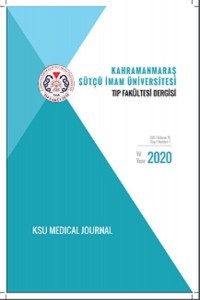İnme Hastalarında Tam Kan Sayımı Parametreleri Fonksiyonel Seviyeyi Gösterir mi?
inme, nöroinflamasyon, fonksiyonel seviye
Do Complete Blood Count Parameters Show the Functional Level in Stroke Patients?
stroke, neuroinflammation, functional level,
___
- Jin R, Liu L, Zhang S, Nanda A, Li G. Role of inflammation and its mediators in acute ischemic stroke. J Cardiovasc Transl Res. 2013 Oct;6(5):834-51. doi: 10.1007/s12265-013-9508-6. Epub 2013 Sep 5.
- Perısteın TS, Weuve J, Pfeffer MA, Beckman JA. Red blood cell distribution width and mortality risk in a community-based prospective cohort. Arch Intern Med. 2009;169:588-94.
- Sanmartí R, Gómez-puerta JA. [Biomarkers in rheumatoidarthritis]. Rheumatol Clin. 2011;6S3:S25-8.
- Pei J, You X, Fu Q. Inflammation in the pathogenesis of ischemic stroke. Front Biosci (Landmark Ed). 2015 Jan 1;20:772-83.
- Dziedzic T. Systemic inflammation as a therapeutic target in acute ischemic stroke. Expert Rev Neurother. 2015 May;15(5):523-31. doi:10.1586/14737175.2015.1035712. Epub 2015 Apr 12.
- Benakis C, Llovera G, Liesz A. The meningeal and choroidal infiltration routes for leukocytes in stroke. Ther Adv Neurol Disord. 2018 Jun 18;11:1756286418783708. doi: 10.1177/1756286418783708. eCollection 2018.
- Ransohoff RM, Schafer D, Vincent A, Blachère NE, Bar-Or A. Neuroinflammation: Ways in Which the Immune System Affects the Brain. Neurotherapeutics. 2015 Oct;12(4):896-909. doi: 10.1007/s13311-015-0385-3.
- Lee Y, Lee SR, Choi SS, Yeo HG, Chang KT, Lee HJ. Therapeutically targeting neuroinflammation and microglia after acute ischemic stroke. Biomed Res Int. 2014;2014:297241. doi: 10.1155/2014/297241. Epub 2014 Jun 25
- Chaney AM, Johnson EM, Cropper HC, James ML. PET Imaging of Neuroinflammation Using [11C]DPA-713 in a Mouse Model of Ischemic Stroke. J Vis Exp. 2018 Jun 14;(136). doi: 10.3791/57243.
- Lossinsky AS, Shivers RR. Structural pathways for macromolecular and cellular transport across the blood-brain barrier during inflammatory conditions. Review. Histol Histopathol. 2004 Apr;19(2):535-64. doi: 10.14670/HH-19.535.
- Wisniewski HM, Lossinsky AS. Structural and functional aspects of the interaction of inflammatory cells with the blood-brain barrier in experimental brain inflammation. Brain Pathol. 1991 Jan;1(2):89-96.
- Perısteın TS, Weuve J, Pfeffer MA, Beckman JA. Red blood cell distribution width and mortality risk in a community-basedprospectivecohort. ArchIntern Med 2009;169:588-94.
- Salvagno GL, Sanchıs-gomar F, Pıcanza A, Lıppı G. Red cell distribution width: A simple parameter with multiple clinical applications. Crit Rev Clin Lab Sci 2015;52(2):86-105
- Holzınger D, Föll D. Biomarkers for chronic in flammatory diseases. Z Rheumatol. 2015 Dec;74(10):887-97.
- Koca TT. Does obesity cause chronic inflammation? The association between complete blood parameters with body mass index and fasting glucose. Pak Jour Med Sci.2017;33(1):65-69. doi: 10.12669/pjms.331.11532
- Koca T, Arslan A, Çiledağ Özdemir F, Berk E. The importance of red cell distribution width and neutrophil-lymphocyte ratio as a new biomarker in rheumatoid arthritis. The European Research Journal, 2018. doi: 10.18621/eurj.376346
- ISSN: 1303-6610
- Yayın Aralığı: Yılda 3 Sayı
- Başlangıç: 2004
- Yayıncı: Kahramanmaraş Sütçü İmam Üniversitesi
Olgularla Hematolojik ve Onkolojik Aciller
Can ACIPAYAM, Tuğba KANDEMİR GÜLMEZ, Muhammed PARLAR, Osman Nuri ÖZEN, Salim EKİCİ, Mehmet ÖRENLER
Gizli Tehdit: Et Yiyen Zoonoz Bakteriler
Aliye SAĞKAN ÖZTÜRK, Serkan İrfan KÖSE
Kliniğimizde Tedavi Gören Suriyeli Hastaların Değerlendirilmesi
Fatma BİLGEN, Alper URAL, Mehmet BEKERECİOĞLU
Cerrahi Alan Enfeksiyonlarının Değerlendirilmesi
Selma ATEŞ, Selçuk NAZİK, Ahmet Rıza ŞAHİN, Fadime KARDAŞ, Ayşegül ERDOĞAN
İnguinal Herniasyonun Nadir Bir Nedeni: Mesane Hernisi
Kadın Doğum ve Çocuk Hastanesinde Doğum Yapan Kadınların Doğum Öncesi Bakım Alma Durumları
Filiz TAŞ, Merve GÜLPAK, Ayşe Aslı OKTAY, Nevres DEMİR
Tirofiban'a Bağlı Diffüz Alveolar Hemoraji ECMO ile Tedavi Edilebilir mi?
Murat KERKÜTLÜOĞLU, Hakan GÜNEŞ, Erdinç EROĞLU
İnme Hastalarında Tam Kan Sayımı Parametreleri Fonksiyonel Seviyeyi Gösterir mi?
Astım ve KOAH Hastalarının Fiziksel Aktivite Düzeylerinin Değerlendirilmesi
